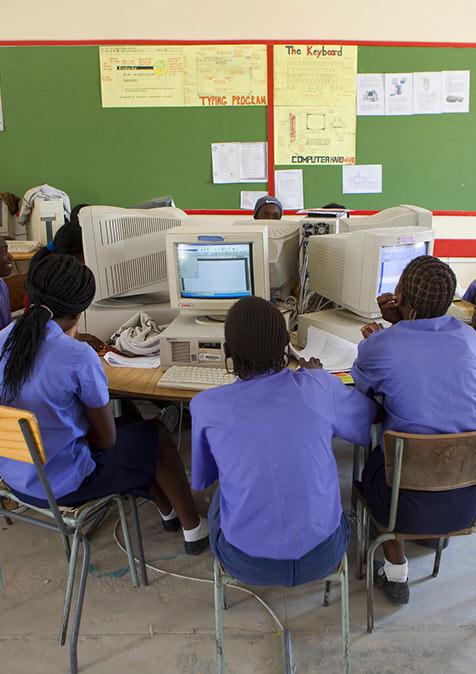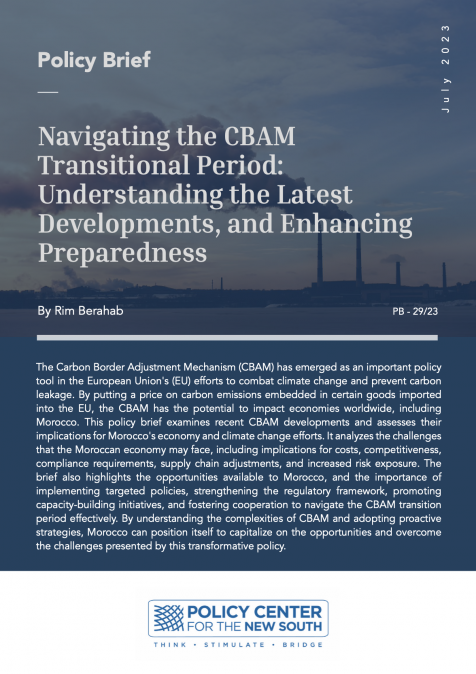Publications /
Opinion
Deborah Braide is a 2022 alumna of Atlantic Dialogues Emerging Leaders program. Learn more about her here.
Although equitable participation in STEM careers has historically been low, through advocacy, policy changes and recent initiatives, African women and youths are now rising to the forefront of STEM and sustainable energy. Maintaining momentum and addressing barriers to entry requires a holistic transformation of educational systems, financing, and socio-cultural norms.
The African education dilemma
In 2021, about 98 million children and youths in Africa were out of school, and the female out-of-school rate was 4.2% points higher than males on the continent, all due to obstacles such as affordability, inadequate school structures, sociocultural traditions, gender discrimination, and several inequalities. The 2022 out-of-school rates in Nigeria increased to 20 million, up from 13 million in 2010. Africa’s educational dilemma inhibits its human capital development and socioeconomic transformation. Access, quality, and relevance, in addition to funding gaps, gender disparities, teacher shortage and inadequate training, continue to be a bane for the region. Many institutions (especially public owned) lack adequate infrastructure for digital learning or technology driven tuition; and career guidance services are insufficient. Therefore, in an increasingly industrialized and technological world, knowledge, applicability, and transferability of the students’ skills is limited. Particularly at the primary school level, it is common for one teacher to handle all subjects, regardless of their specific expertise and passion. This can affect students' interest in specific fields, including STEM. Assigning teachers to subjects they are best fit for is crucial for proper delivery.
The approach to African education requires collaboration between government, private sector, and civil society to ensure equitable access and global quality standards. Access to quality education should be affordable for all social classes and encourage curiosity, innovation, and real-world problem-solving. Rotational programs, internships, excursions, and hands-on STEM training can expose students to various professions as well as help bridge academic study or research with practice. However, in most cases, this opportunity is limited to expensive private schools, leaving students in public schools behind. Despite the challenges, several organizations are making a positive impact on African education. Slum2school is bridging the education gap for underprivileged children in Nigeria. The African Leadership Academy in South Africa is nurturing future African leaders. Ashesi University in Ghana is transforming educational outcomes through private-sector involvement. The 1337 coding school in Morocco provides world-class learning opportunities in software development, empowering students to start businesses or work for global organizations. Regional institutions and governments can go further to develop virtual innovation camps and peer learning programs to address the challenges faced by women and youth with limited physical access to such opportunities. These initiatives can help expand educational access and foster talent across Africa.
Mentorship and Early Industry Exposure
Beyond education, mentorship and exposure also influence interest and participation in STEM and sustainability. My career journey in engineering and sustainable energy was inspired by my engineering professor aunt, my mothers’ efforts to expose me to vast knowledge and experiences, and my undergraduate research project on waste conversion to biofuels, followed by several personal and professional pursuits. The power of role models and mentorship who show that success is possible cannot be overstated. Some African women and youths are the first generation in their families to advance to secondary or tertiary education. As such, they may not have role models and mentors in their immediate environment to help shape their career trajectory and build an understanding of what STEM fields entail.
Initiatives such as the UNESCO STEM mentorship programme in Kenya, AIMS’s Girls in Mathematical Sciences Fellowship Program with the Government of Ghana, and programmes by organizations including the Society for women engineers and Women in big data Nigeria integrate hands-on industry exposure and training on relevant skills based on the participants’ interests. Where individuals cannot access direct mentorship programmes, shared community, apprenticeships and peer mentorship also offer significant advantages in shaping mindsets and accessing opportunities for personal and professional development.
Gender Bias
Systemic biases in family, classrooms, and professional settings disproportionately impact women in STEM fields. STEM professionals are often represented in textbooks and media as male. Therefore, inclusion and representation of all genders helps promote diversity and positive association of women with STEM occupations. Cultural norms often confine girls to specific roles, reinforcing stereotypes that they are unsuited for male-dominated technical areas. Even within STEM, women are often underrepresented in fields such as engineering compared to life sciences. This early conditioning erodes their confidence to pursue STEM careers or negotiate adequately. The Stanford School of Business found that men who are more assertive in entry-level STEM positions earn up to $4000 more than their equally qualified female counterparts. In addition to gender pay gaps, gender biases often lead to non-inclusive workplaces, and unequal burdens between career and family responsibilities.
Fragmented parental leave policies and discriminatory regional practices further hinder women's career progression. For example, women typically spend 2 - 10 times longer on childcare than men. To redistribute these responsibilities, policymakers should provide unified and mandatory paternity leave policies with accommodation for paid leave so as to not negatively impact the household income. However, in regions where paternity leave may be unrealistic due to the informal and vulnerable nature of most African jobs, there should be support infrastructure for child care that can be provided in organizations, community centers and parks.
The sustainable energy sector needs women and youths
Globally, an addition of 700,000 new jobs brought renewable energy sector employment to 12.7 million jobs in 2021, with over 300,000 in Africa. The energy transition could create an additional 9 million jobs between 2019 and 2030 and boost employment to 4 million in Africa by 2030, with most of these jobs in solar, bioenergy, wind and hydropower. The African renewable energy sector has substantial potential for job creation and improving energy access, particularly in rural areas. However, professionals with green skills are needed to support energy access and transition, and increased representation of women and youth is essential. According to IRENA, 22% of global energy sector professionals in 2019 were women, and 32% in renewable energy. In OECD countries, women account for just 28% of green jobs and as of 2022, women made up only about 14% of senior management roles in the energy sector with little disparity between clean and traditional energy fields. A Power for all study showed that in Nigeria, only about 28% of the DRE sector were youth and 27% in the sector were women.
Deliberate public policies, private sector involvement, and institutional reforms are required to develop a skilled workforce with STEM-based and soft skills, including updating educational curricula, aligning energy and workforce development policies, establishing industrial research partnerships, and providing capacity-building programs. Standardizing the informal sector and reskilling workers are also essential steps to expand the talent pool in the sustainable energy sector.
Se4All, ENEL Foundation Open Africa, the Rocky Mountain Institute Global Fellowship Program and Women in African Power Network offer several online and experiential professional development programmes as well as networks that African energy professionals can take advantage of.
Addressing the skills gap and nurturing a talented workforce will contribute to support Africa’s energy transition, bridge the energy access gap, and foster economic growth while empowering women and youth to lead the way towards a greener future.
Deborah Braide is an international development and energy specialist. She is a 2022 Atlantic Dialogues Emerging Leaders alumna.
The author would like to recognize Rose-Margaret Ekeng-Itua, Sarah Egbo and Kofi Adotey for their reviews and their work in African STEM development and gender equity.
The views expressed in this op-ed are solely those of the author and do not reflect the opinions of the PCNS.








